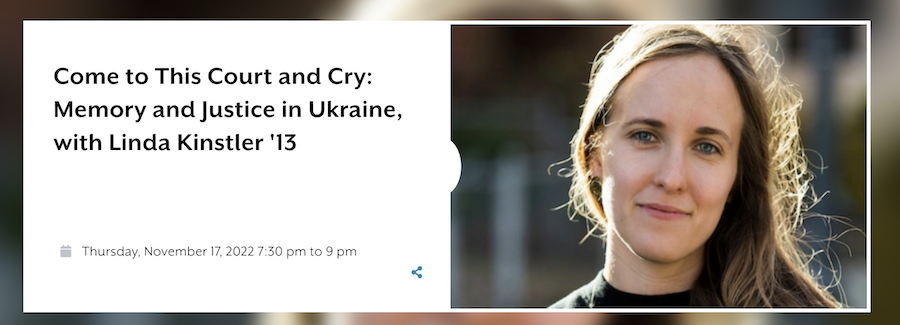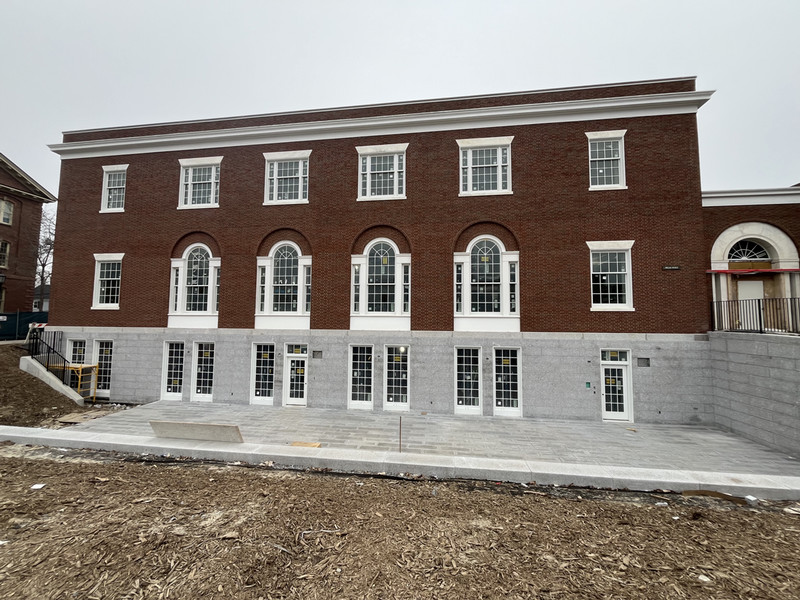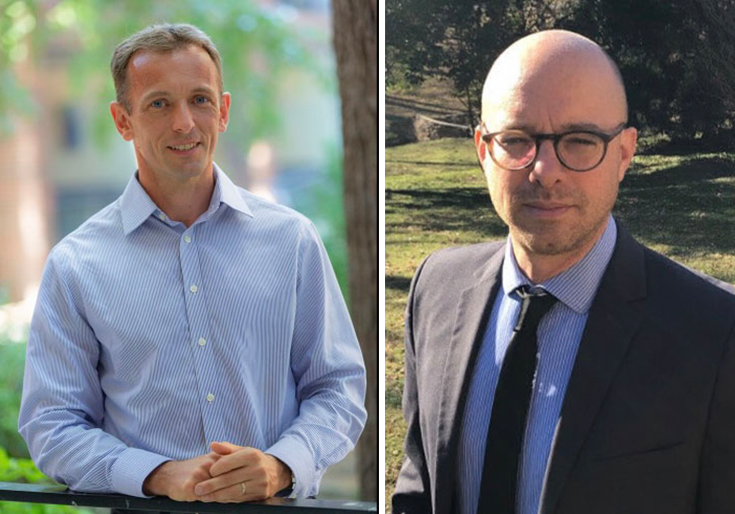Linda Kinstler ’13 Emphasizes the Power of the Personal Narrative
By Jane Godiner ’23
Kinstler's bylines have appeared in The New York Times, The Washington Post, The Atlantic, The Economist, and Jewish Currents. Her recent book, Come to This Court and Cry: How the Holocaust Ends, published by Public Affairs, is being translated into five languages. She is currently a PhD candidate in rhetoric at UC Berkeley, and previously studied as a Marshall Scholar at the University of Cambridge.
The Russian department invited Kinstler to give a talk on November 17 to discuss Ukraine and possible legal, and journalistic, responses to the war and its traumas.
“This talk is going to go backwards and forwards in time to try to share some of the questions that I and my colleagues have been asking,” Kinstler said at the beginning of her lecture. “What does justice look like in Ukraine? Will courts undertake the necessary investigations and trials? And, most importantly, what can we do with everything they don’t recognize—what are the testimonies, the evidence, and the bodies that will inevitably be excluded from the account?”
Throughout her presentation, Kinstler melded historical contexts of post-war justice—and a lack thereof—within the context of Ukraine’s present. She argued that these historical patterns are critical tools for analyzing the current moment.
“The avenues that are currently being discussed for how we might go about adjudicating what is going on in Ukraine…all refer back to old concepts and are drawing on historical instances,” she said.
A key tenet of the lecture was how censorship and the institutional practice of rewriting history will affect the picture of justice in Ukraine.
“A lot of my work talks about legal fiction and the relationship between literature and the law. Indeed, the legal system in many countries makes room for and produces its own fictions,” Kistler said. “Unfortunately, as much as law produces its own fictions, it is also very bad at undoing the ones that it is presented with.”
Kinstler believes that the role of journalists—both foreign and domestic—cannot be understated in the effort to preserve history and ensure justice. In her lecture, she discussed the importance of collecting testimony in order to avoid widespread “legal fiction.”
“Local journalists [will be] on the ground to collect testimonies in accordance with legal requirements, to document the atrocities that they witness before they are speedily erased,” Kinstler said. “The first [step] is to collect testimonies for use in legal proceedings, and the second is to publicly spread the narratives that they're collecting.”
Not only did Kinstler state the importance of both legal and interpersonal avenues of spreading information, but she argued that both are necessary for the advancement toward justice for Ukraine.
“In the logic [of this plan for journalists] is an acknowledgement that neither of them is enough—that you will fail if you only go to the law, and you will fail if you only take another approach,” she said. “You really have to do both, and you have to do them all the time.”
Throughout her talk, Kinstler shared anecdotes from her book, Come to This Court and Cry, to illustrate some of the challenges that come with these efforts to preserve history.
“I encountered many people who actively refused to participate in legal proceedings, not wanting to play the role of ‘the survivor’ and not wanting their testimonies to be instrumentalized,” Kinstler said. “These moments bring out the shared paradoxical sentiments that legal proceedings produce.”
Whether by highlighting these firsthand accounts or by bringing in historical narratives, Kinstler’s lecture highlighted the tensions between advancing justice for Ukraine while still honoring the stories of those most affected by the country’s conflicts.
“Let's train journalists not to do damage, and, more optimistically, to do something constructive,” she said as her lecture concluded. “They are bound by an obligation to share the stories and secure the narratives so that they can be less easily undermined, but they also must make sure that whatever trials do happen in the future can proceed.”



